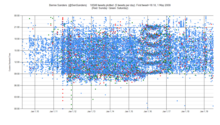Social media in the 2016 United States presidential election
Social media played an important role in shaping the course of events surrounding the 2016 United States presidential election, with candidates adopting differing strategies to use the technology to their advantage.
Republican nominee Donald Trump pursued a more personal and informal communication style, commenting on other candidates, ongoing events, and news coverage of himself.
In contrast, Democratic nominee Hillary Clinton adopted a more curated approach, reusing her party's previous strategies of turning social media into a platform to further centralized campaign messaging.
The ability for anyone to create, comment, and share content on social media also facilitated greater voter interaction with the political climate, providing new opportunities for the fundraising, debate, and discussion of candidates.
Following the election, disclosures of personal data misuse by Facebook and political consulting firm Cambridge Analytica were reported on by The Guardian and The New York Times.
[2] Throughout the primary and general elections, candidates campaign nationally, making holding events and purchasing television and radio advertisements to try to communicate their views.
Throughout the election, Russian government-affiliated agencies made use of multiple social media accounts and platforms to try to influence the electorate, targeting their activity against Democratic nominee Hillary Clinton.
[20][21] He continued to use social media to share his opinions on various topics during his campaign in a personal style, unlike his opponent Hillary Clinton, who maintained a more curated image.
[22] Slate described his strategy as "retain[ing] his vulgar vigor and translated it into the political arena",[23] and the Washington Post noted his ability to "use it in a way that truly shapes — not just amplifies — his message".
[27] His campaign was able to leverage his social media presence to spread his message, particularly on Twitter, where his posts would often be "retweeted" among his supporters—much more frequently than for other candidates—and this virality was credited with reducing his advertising expenditures.
Almost immediately thereafter, the Trump campaign posted his comment as part of a video showing mugshots of illegal immigrants who committed violent crimes in the US, intercut with footage of Bush using the phrase.
[53][54]In April 2016, Correct the Record, a pro-Clinton super PAC, announced a program called "Barrier Breakers" intended to rival the largely online volunteer efforts of Sanders and Trump supporters.
[55] With $1 million in funding, Correct the Record employed paid staff described as "former reporters, bloggers, public affairs specialists, designers" to respond to negative content about Clinton.
[58] Additionally, one of her videos on Snapchat, where she proclaimed that she was, "Just chillin', in Cedar Rapids", quickly became a meme on video-sharing app Vine, gaining over 17 million plays in a month.
[70] Separately, in August 2015, he tweeted a graphic from the Clinton campaign which was edited to highlight the recent increases in student debt under the Obama administration.
[74] After the elections, two separate investigations were opened into social media-related activities: one into the misuse of personal data by political consulting firm Cambridge Analytica, and another into Russian attempts to influence voters online.
[75][76] In March 2018, former Cambridge Analytica employee Christopher Wylie revealed to the press that during the 2016 election, the company harvested the personal information of Facebook users without their consent, in breach of the platform's data policies.
[78] The information collected was subsequently used to build data profiles on users, which were then used for targeted political advertising by the Donald Trump and Ted Cruz campaigns.
[89] In May 2017, a Special Counsel investigation was conducted by Robert Mueller, which ultimately concluded in its final report that the Russian government's activities on social media "violat[ed] U.S. criminal laws in order to interfere with U.S. elections and political processes.





